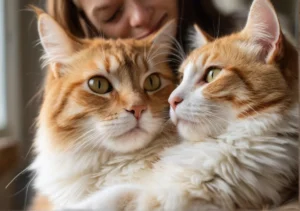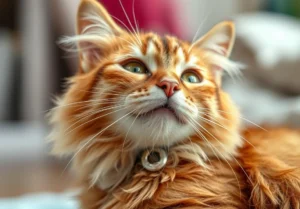Mother cats turning on their kittens can be a confusing and concerning behavior for many cat owners. Understanding why this behavior occurs can help shed light on this puzzling phenomenon.
It can be distressing for cat owners to witness a mother cat turning on her kittens, but there is a reason behind this behavior. Mother cats may turn on their kittens due to stress, illness, or feeling threatened. Understanding these triggers can help cat owners navigate this challenging situation with compassion and care.
Signs of Stress in Mother Cats
Mother cats, much like humans, can experience stress. When a mother cat is feeling overwhelmed or anxious, she may exhibit certain signs that indicate she is under a lot of pressure. Some common signs of stress in mother cats include excessive grooming, aggression, restlessness, loss of appetite, and hissing or growling at their kittens. These behaviors can escalate and result in the mother cat turning on her kittens.
Keep an eye out for these signs of stress in your mother cat. If you notice any of these behaviors, it’s essential to address the root cause promptly to prevent any harm to the kittens. Providing a calm and safe environment for the mother cat can help alleviate her stress and improve her relationship with her offspring.
Illness as a Factor
Illness can play a significant role in a mother cat’s behavior towards her kittens. Just like humans, when cats are feeling unwell, they can become irritable, aggressive, or even neglectful towards their young ones. If a mother cat is suffering from health issues such as infections, pain, digestive problems, or fever, it can impact her ability to care for her kittens properly.
It’s crucial to monitor your mother cat’s health closely and seek veterinary attention if you suspect she is unwell. Addressing any health concerns promptly can help improve her overall well-being and prevent her from turning on her kittens due to feeling unwell. Remember, a healthy and happy mother cat is more likely to be a loving and attentive parent to her little ones.
Additional Insight: An important factor to consider is the mother cat’s age. Young or inexperienced mother cats may also exhibit stress or aggression towards their kittens due to feeling overwhelmed by the responsibilities of motherhood. Providing support, guidance, and a calm environment can help alleviate their stress and ensure a positive relationship with their kittens.
Feeling Threatened
When a mother cat feels threatened, whether by a perceived danger or stressors in her environment, this can lead her to turn on her kittens. Just like humans, cats can become defensive when they feel their safety or territory is at risk. It’s essential to create a safe and secure environment for the mother cat and her kittens to minimize the chances of her feeling threatened and exhibiting aggressive behavior towards her offspring.
Behavioral Changes in Mother Cats
Behavioral changes in mother cats can be a red flag signaling an underlying issue that needs attention. If a mother cat suddenly starts avoiding or hissing at her kittens, it could indicate discomfort, pain, or stress. It’s crucial to observe her behavior closely and seek veterinary advice if these changes persist. Additionally, disrupted maternal behavior could be a sign of an imbalance in the mother cat’s hormones, causing her to act out towards her kittens unintentionally. Regular check-ups with a veterinarian can help identify and address any potential health concerns early on.
Signs of Behavioral Changes in Mother Cats:
– Avoiding her kittens
– Hissing or growling at her kittens
– Refusing to nurse or groom her kittens
– Showing signs of stress or anxiety
– Displaying sudden aggression towards her kittens
Remember, a mother cat turning on her kittens is a serious issue that requires prompt attention and intervention to ensure the well-being of both the mother and her offspring.
Importance of Providing a Safe Environment
Creating a safe and secure space for mother cats and their kittens is crucial in preventing aggression. Just like humans, animals need a peaceful environment to thrive. Make sure the area is free from potential threats, loud noises, or other stressors. This safe haven can help reduce the likelihood of the mother cat turning on her kittens out of fear or anxiety. Providing a cozy nesting area, ample food and water, and a quiet space away from disturbances can go a long way in ensuring a harmonious relationship between the mother cat and her litter.
Seeking Veterinary Advice
If you notice that a mother cat is persistently displaying aggression towards her kittens, it’s essential to seek professional help from a veterinarian. Aggression in mother cats can be a sign of underlying medical issues, such as pain, hormonal imbalances, or even psychological distress. A vet can conduct a thorough examination to determine the root cause of the aggression and recommend the appropriate course of action. By addressing any health concerns promptly, you can help ensure the well-being of both the mother cat and her kittens.
Additional Insight: It’s crucial to remember that mother cats can also become aggressive towards their kittens if they feel overwhelmed or stressed. Ensuring that the mother cat has adequate support and a peaceful environment can help alleviate these feelings and promote a more nurturing relationship with her offspring.
Creating a Positive Bond
When a mother cat starts displaying aggression towards her kittens, it can be a distressing situation for everyone involved. To prevent this behavior, cat owners can take steps to foster a positive relationship between the mother cat and her kittens. One effective way to do this is by providing a safe and peaceful environment for the mother and her kittens. Make sure they have a quiet space with plenty of hiding spots and comfortable bedding. Additionally, owners should handle the kittens gently and regularly to help them become accustomed to human touch. By creating a stress-free and nurturing environment, cat owners can help the mother cat feel more secure and less likely to turn on her kittens.
Interesting Fact: Maternal Instincts
Did you know that mother cats have strong maternal instincts that drive their behavior towards their kittens? In the wild, mother cats instinctively hide their kittens to protect them from potential predators. This instinct can sometimes be triggered in domestic mother cats, leading them to move their kittens to a new location or exhibit aggressive behavior. Understanding this natural instinct can help cat owners empathize with their mother cat’s actions and provide the support needed during this challenging time.
Additional Insight:
– Providing the mother cat with a high-quality diet rich in nutrients can help support her physical and emotional well-being, reducing the chances of aggression towards her kittens. High-quality food can also improve the mother cat’s milk production, ensuring her kittens receive essential nourishment.
By taking proactive steps to strengthen the bond between a mother cat and her kittens, cat owners can help create a harmonious and safe environment for the entire feline family.
Alex, a passionate animal lover, has experience in training and understanding animal behavior. As a proud pet parent to two dogs and three cats, he founded AnimalReport.net to share insights from animal experts and expand his knowledge of the animal kingdom.




